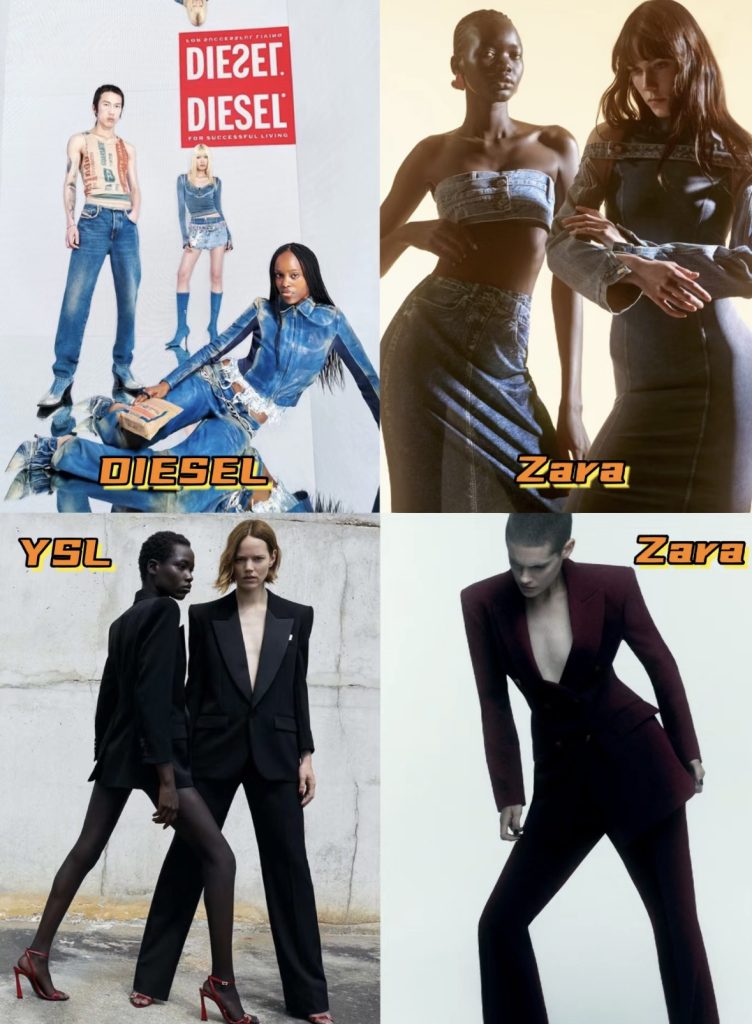
In the Frankfurt School’s theory of cultural industry, cultural products are standardized and commoditized for mass production and sale, undermining individual creative and critical thinking. This theory is not only applicable to mass media, but also permeates all fields of modern business, and the fast fashion industry is a typical representative of it. These brands are constantly innovating to quickly deliver trendy items needed by the mass market at lower prices. This pattern of production and consumption fits into the Frankfurt School’s core thesis about the culture industry, namely, the commodification and mass manipulation of culture.
As the world’s leading fast fashion brand, Zara quickly transforms high-end fashion show designs into consumable goods for the masses through its “see now, buy now” model. This business model reflects the commodity standardization and mass production characteristic of the cultural industry: transforming fashion art into products that can be consumed quickly to meet the needs of global consumers while maintaining maximum profits. This model not only changes consumers’ understanding of fashion, but also intensifies the commodification of culture, making personalization and self-expression standardized experiences that can be consumed.
This commodification of fashion is the embodiment of the Frankfurt School’s critique of mass culture, which holds that standardized cultural products appease consumers by providing false gratification. In Zara’s case, consumers are drawn to the appeal of being “fashion-forward,” but in reality they are participating in a system that prioritizes profit over personal expression or sustainability. The rapid updating of styles leaves limited room for personalized interpretation and lasting value, in line with Adorno and Horkheimer’s idea that culture is reduced to just another link in the capitalist machine.

Zara’s “See Now, Buy Now” model not only accelerates fashion consumption, but also intensifies the capitalist logic criticized by the Frankfurt School. By bringing high-end fashion to market quickly and at low prices, Zara continues to stimulate consumers’ desire to shop, reinforcing the idea that people seek satisfaction by buying the latest trends. This illustrates the role of the chemical industry in manipulating desire and shaping consumer behavior.
Therefore, Zara’s fast fashion model is a powerful example of the operation of the culture industry.
Reference List:
Adorno, T., & Horkheimer, M. (1944). Dialectic of Enlightenment. Verso.
Ghemawat, P., & Nueno, J. L. (2006). Zara: Fast fashion. Harvard Business School Case Study.
Joy, A., Sherry Jr, J. F., Venkatesh, A., Wang, J., & Chan, R. (2012). Fast fashion, sustainability, and the ethical appeal of luxury brands. Fashion Theory, 16(3), 273-295.
Scannell, P. (2007). Media and Communication. SAGE Publications.
Tokatli, N. (2008). Global sourcing: insights from the global clothing industryÔÇöthe case of Zara, a fast fashion retailer. Journal of Economic Geography, 8(1), 21-38.




I think your blog makes a strong case for how ZaraÔÇÖs fast fashion reflects the Frankfurt SchoolÔÇÖs critique of the culture industry. I agree that turning fashion into a quick, standardised product pushes constant consumerism and leaves little room for personal expression. but I wonder if fast fashion also democratises fashion by making trends accessible to people who can’t afford luxury. Could that be a positive side of commodification? Overall, it’s a thought-provoking take on fast fashion and its cultural impact.